The History-Making Dean’s Eight Dynamic Years
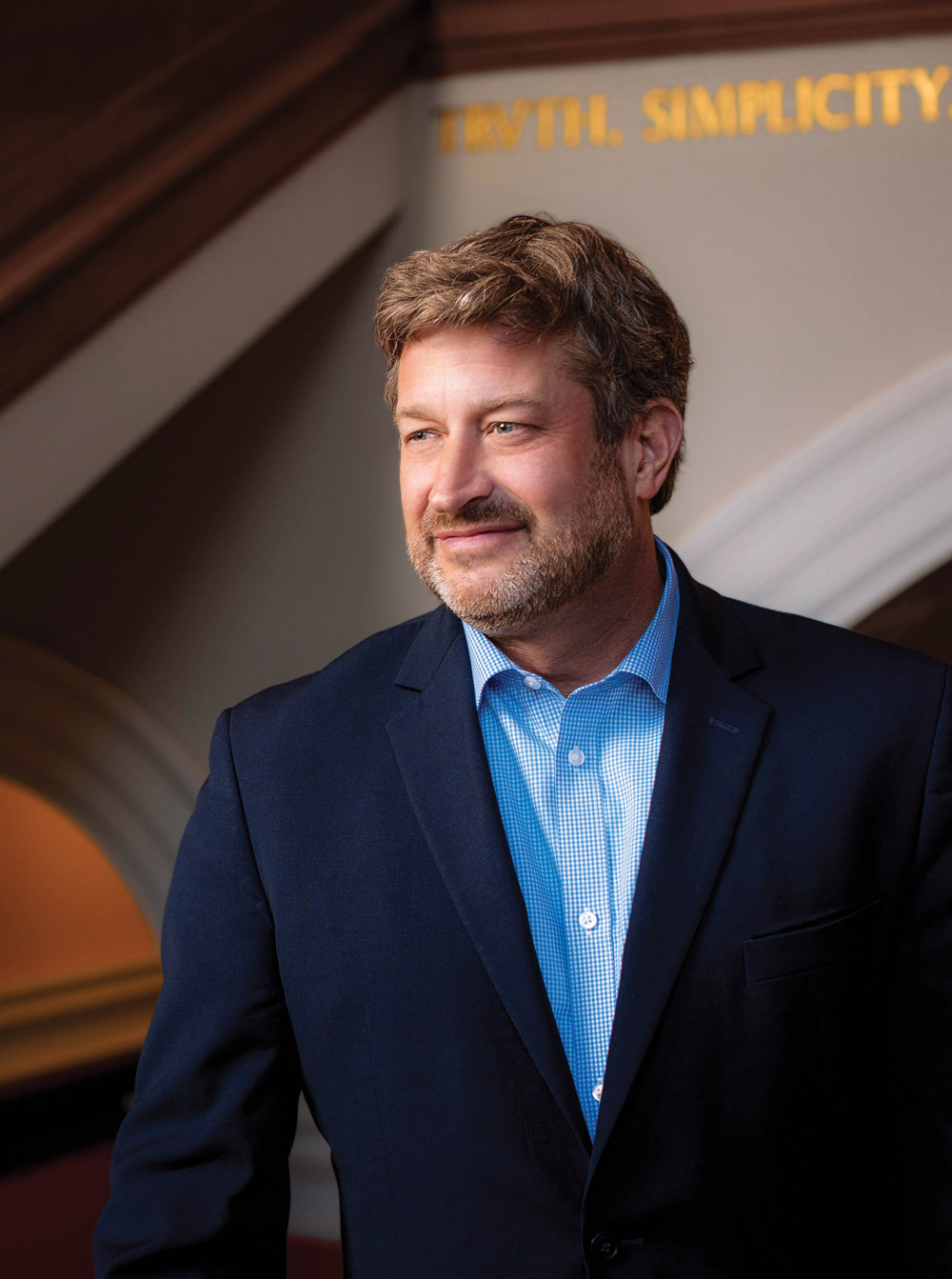
The History-Making Dean’s Eight Dynamic Years

“That took both guts and collaboration,” said Deputy Dean and William A. Schnader Professor of Law Dave Hoffman. “Ted facilitates group decision-making and backs up those decisions.”

Pandemic Leadership
When the crisis halted in-person classes, Ruger made a series of crucial decisions in consultation with his team. Moving with incredible dispatch, faculty and staff took just one week to put together a plan to provide a world-class, virtual legal education.
In addition, the Law School shipped belongings home to hundreds of students, found temporary housing in Philadelphia for students who could not travel, provided free meals from local restaurants, and converted more than 190 courses to an online format with scanned course materials in just days.
Penn Carey Law followed that with a commitment to freeze tuition for the entire upcoming academic year—one of the few law schools to do so—while also committing to a planned double-digit percentage increase in financial aid in the immediate future.
Perry Golkin W’74, WG’74, L’78, former Chair of the Penn Carey Law Board of Advisors and Adjunct Professor of Law, said Ruger moved the Law School forward despite the headwinds of the pandemic. “I can’t think of any metric where we didn’t make progress,” he said.
As a result, he said, the Law School “is perfectly positioned for the future.”
“Are we positioned to train law students in the future? Are we positioned to recruit more faculty? Are we positioned to increase financial aid? We’re perfectly positioned to continue despite what I consider a pretty turbulent time.”
Beyond pandemic management, Ruger’s tenure was marked by a string of accomplishments and a palpable sense of momentum and growth at the Law School.
“Ted combines a reflective, low-key demeanor with a steely determination to meet his goals on behalf of the Law School,” said Osagie Imasogie LLM’85, Chair of the Penn Carey Law Board of Advisors. “And meet them he has with flying colors, setting up the next dean for success. He has been an effective leader, and it has been my privilege to work alongside him.”
Steadfast Commitment to Diversity and Inclusion
Dave Hoffman, who joined the faculty during Ruger’s tenure, hailed the transformation of the faculty from one that was 75 percent men to one that is almost half women today. He said the faculty now better reflects the student body and the national population. “Our student body is significantly more than 50 percent women right now and the faculty should change to reflect the evolving profession.”
Deputy Dean and Professor of Law Allison Hoffman added that Dean Ruger “bolstered the Law School as a multidimensional institution, hiring extraordinarily talented academics.”
Ruger has also strongly supported the establishment of the Law School’s Office of Equity & Inclusion, a hub for the Law School’s expanding efforts to reduce barriers to legal education; to promote community education on matters of diversity, equity, and inclusion; and to focus on our institution’s practices advancing diversity, equity, and inclusion as core to the school’s commitment to providing a world-class legal education.
Arlene Rivera Finkelstein, Associate Dean for Equity & Justice and Chief Diversity, Equity & Inclusion (DEI) Officer, said: “Ted’s support has enabled the expansion of essential financial resources for students, as well as deep substantive engagement in matters involving diversity, equity, and inclusion throughout the countless extraordinary events that have taken place during his tenure. There have been numerous challenges, but Ted’s commitment and support have been unwavering.”
Among the many tangible outcomes of this support, the Dr. Sadie T. M. Alexander Scholarship program is well underway, with a third class of scholars joining the Law School this fall; the Office of Equity & Inclusion is established and expanded; and a new Diversity Dashboard will document the growing diversity of the Law School community.
Enriching the Student Experience
According to Dean of Students Felicia Lin L’08, Ruger has demonstrated again and again his concern for the welfare of students, pointing to his unwavering advocacy of incorporating a Wellness module into every one of the Law School’s sections of Professional Responsibility, a required course for graduation, to ensure that building a set of wellness skills was linked to a lawyer’s professional identity from the start. Penn Carey Law was the first law school in the country to take this measure (since adopted by many), and earlier this year, Bloomberg Law named the Law School a finalist in its inaugural Law School Innovation Program for taking this pioneering step five years ago.
Beyond this curricular measure, Dean Lin said Ruger gave Student Affairs the wherewithal to create a block of activities, programs and individualized care in support of health and wellness initiatives at a time when it is needed more than ever with rising concerns about the pressures of law school and legal practice.
“Throughout his tenure, Dean Ruger consistently asked, ‘How does this impact our students?’ He has always had a steadfast commitment to ensuring that we are offering students the best legal education possible and providing a supportive, collegial, and welcoming community for all,” Lin said.
Then there’s Ruger’s advancement of the Master in Law (ML) program, which provides a wide range of professionals a grounding in the law that can be applied in the workplace. The program does this via a Master in Law degree, a Certificate in Law and the opportunity to take courses on an ad hoc basis.
Ruger, one of the original architects of the program, has long held that the study of the law should not be limited to lawyers, given its pervasive influence in society.
The program is the fastest growing degree program at Penn Carey Law, and has drawn professionals from the worlds of healthcare, technology, business and finance, education, social work, and public policy. Since its inception nine years ago, 163 professionals have graduated and 119 more are in the process of earning their degrees. The ML program offers a creative example of how the curriculum advanced on Ruger’s watch.
“Ted’s innovative mindset and collaborative spirit helped us think outside the box and imagine what the program could become, and indeed what it has become: a tremendous value-add for its students and our entire law school community alike,” said Catharine Restrepo L’93, Executive Director of the ML program.
“Ted’s greatest gift to the program and our students has come in the form of his time mentoring our students and teaching two classes—Constitutional Law and Health Law and Policy—showing our students how much he values them through this commitment.”
Transformative Gifts
In 2019, the W. P. Carey Foundation made a $125 million gift, the largest ever in American law school history, allowing Penn Carey Law to make resounding investments that will advance the Law School for years to come. As an unrestricted gift, it gives the Law School enormous latitude to build programs and address needs as they arise.
Ruger called the gift “a pivotal chapter in the history of legal education.”
“In the years since the gift was made, Penn Carey Law has continued to build on the incredible momentum generated by our historic partnership,” said Ruger. “We are recruiting the brightest scholars to join our faculty, providing our students with an incomparable classroom experience, and the opportunity to engage in innovative research that will reshape the legal field. We have bolstered our student financial support, opening our doors to exceptionally talented aspiring professionals with diverse backgrounds and interests. We have fortified our hallmark cross-disciplinary curriculum to prepare our students for the multifaceted challenges of the 21st century.”
Take, as just one example, financial aid, which has increased by 66 percent over the last several years and will grow by an additional $8 million over the next five years, paving the way for Penn Carey Law to recruit the best students, whether first- generation professionals or those dedicated to pursuing careers in public interest.
Speaking of public interest, Ruger’s legacy also rests on the provision of a $50 million gift from the Robert and Jane Toll Foundation that has resulted in a dramatic expansion of the Toll Public Interest Scholars and Fellows Programs—in which students explore the possibilities of a career in public service—and an anticipated doubling of public interest graduates in the coming decade.
The gift, an extension of years of philanthropic support for the program from the late Bob Toll L’66 and his wife Jane Toll GSE’66, was also the largest gift of its kind in law school history, and a perfect match for a school in which public interest has been deeply rooted for many years.
Statistics tell the story: Public interest placements were at an all-time high during the 2021-22 academic year, with 125 students completing externships. That same year, 50 community partners worked on 22 student-led pro bono projects, and 600 students logged more than 14,000 pro bono hours.
Overall, the most recent fundraising campaign, concluded in 2021, was the most successful in law school history, reflecting the continuous and generous support of a wide range of alumni and friends from across the law school community. That support has positioned Penn Carey Law to forge a new brand of legal education.
By the Numbers











The Future of the Profession
FPI, launched in 2019 to much fanfare, is living up to its promise as one of the country’s leading incubators of thoughtful and compelling cross-disciplinary discussions on the dynamic forces propelling change in the legal profession.
At the latest conference, FPI announced an exciting effort called the Future of the Profession Lab that will focus on innovation in service delivery. The Lab’s goals include improving technology to democratize law, simplifying court processes, reducing client costs, and ultimately increasing access to justice, particularly for those of limited means—and scaling these solutions in a way that can be replicated across the legal profession.
“It’s hard to overstate how important and rare it is for a law dean to understand the need to innovate as we hurtle toward a rapidly changing future,” said Jennifer Leonard L’04, Chief Innovation Officer and Executive Director of the FPI. “Ted not only knows this, but also sees how imagining new ways to teach can became a force multiplier for reimagining broken legal systems.”
“The need for change is not on the horizon—it’s here, now. And Ted’s support of FPI’s work gave Penn Carey Law a crucial head start in putting the next generation of its graduates in the driver’s seat as they prepare to navigate the exciting and unpredictable road ahead.”
When Ruger became Dean on July 1, 2015, he noted the imperative to make legal training relevant in a world of increasing automation. He realized that changes in the profession required a stepped-up-effort to create new opportunities in areas such as public service. He knew that students and faculty needed to be better connected to policymakers.
Eight years later, there has been, for instance, an explosion in experiential learning, with 132 courses now available; a sixfold increase in externships since 2010; and direct financial support for 150 students seeking fellowships in government work. Nearly two-thirds of graduates either earn a certificate in a law-related discipline or one of 35 cross-disciplinary degrees.
All of which, in the eyes of Allison Hoffman, speaks to Dean Ruger’s legacy.
“Ted has a really good sense of where legal practice is going,” Hoffman noted. “He sees all the moving parts. He really gets the big picture.”
“He’s put in place the building blocks for Penn to continue to be one of the best law schools in the country even as the legal profession changes. People are going to recognize his contributions for a long time.”
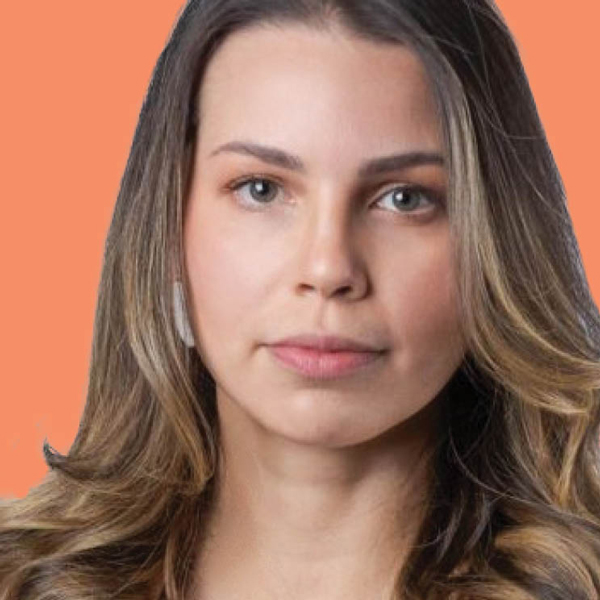


Marcela Brasileiro Castilhos Rebelatto LLM’23
The São Paulo native is a corporate real estate lawyer at Lefosse Advogados, one of the largest law firms in Latin America, and has a decade of experience as an attorney.
She was recently recognized by her Brazilian peers and clients as a Legal500 Rising Star and an Associate to Watch by Chambers and Partners. The recognition gave her a big boost.
“It meant a lot to receive these recognitions while away from home and from my colleagues and clients,” she said. “It makes me eager to excel here at Penn and live up to those higher expectations.”
She chose to earn her LLM degree to better understand the United States’ legal framework, so that she can better advise both Brazilian and American clients and also facilitate cross-border transactions, while forging valuable connections with peers and law firms. Brasileiro said she was drawn to Penn Carey Law’s value of inclusivity and the close relationships among students the school fosters.
“They encourage us to connect, to make friends, to talk to people in order to expand our visions in the profession,” she said. “The collegial environment is something that differentiates Penn from the other schools.”
While her professional focus is business in the real estate sector—including mergers and acquisitions, finance and workouts, investment funds, and industry banking—the topic of attorney well-being is important to her, both as a legal professional and a law student.
“There’s a lot of taboo around it,” she said. “People don’t talk about their struggles and don’t like being vulnerable. I believe there is momentum for our generation to start advocating for well-being and take actions towards the creation of a better organizational culture in the legal field.”
In São Paulo, Brasileiro was in a leadership position and managed a team of lawyers and interns. She saw, firsthand, the effects of the pressures of working at a big law firm. She talked to several people on her team and found that many felt alone in their professional anxieties. “One of the things I try to do as a leader is to promote a safe harbor for all of my colleagues to express their feelings and understand they are not inadequate, we are not alone and we can all thrive.”
At the Law School, Brasileiro said similar anxieties exist, and she isn’t immune. Brasileiro has endured culture shocks, high expectations to perform in law school, keeping up with readings in English, and surviving the Socratic method and cold calls in classes. To tackle her own demons, Brasileiro meditates for about 10 minutes daily and has joined the boxing club at Penn.
“It helps me focus and shake off the stress,” she said, adding that she makes a concerted effort to keep up with struggling classmates. “I genuinely try to be someone they can be honest with, because I also face difficulties…that creates trust and a psychological safety net and makes everyone accountable for the group’s well-being.”
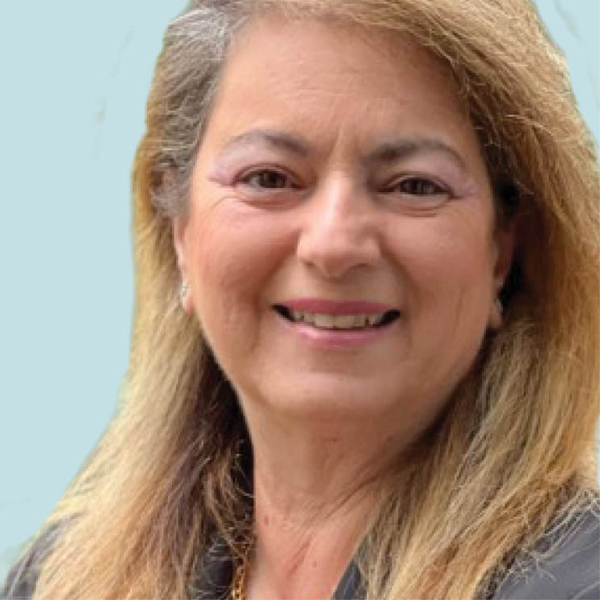

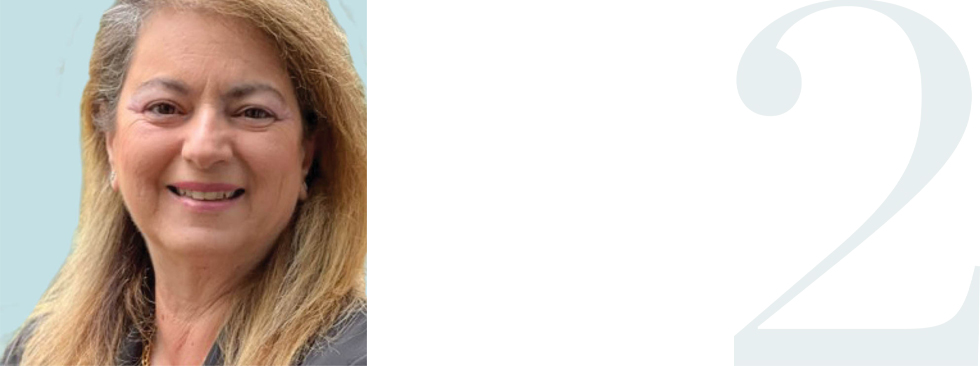
Dr. Melpo Christofidou-Solomidou ML’23
“That is exactly what I wanted—I don’t want to be a lawyer, I’m not a lawyer, but I love law, and I’d love to know about the law, it should be able accessible to everyone,” she said. “And that’s exactly my approach to it, and I’ve loved every moment of it.”
The second act of her illustrious career began with an email advertisement from Penn Carey Law. During the COVID-19 lockdown, the Law School disseminated information to Penn faculty from other professional schools about its Master in Law program.
In many ways, Christofidou-Solomidou’s introduction to law is a natural progression of her career. She joined the Department of Medicine at the Perelman School of Medicine for her post-doctoral fellowship in 1993. She rose through the ranks to Research Professor of Medicine at the Pulmonary, Allergy, and Critical Care Division, where for three decades, she maintained a research lab dedicated to the investigation of acute and chronic lung disease.
During her tenure, the NIH and NASA funded more than $12 million in grants for her studies on lung disease resulting from radiation and other toxic exposures. Upon patenting her discoveries stemming from that research, in 2013 she founded a startup company, LignaMed LLC, in collaboration with the University of Pennsylvania to work toward commercializing the technology. Preparations are ongoing, she said, for pre-senting the therapeutic to the FDA. In 2018, she began a second startup with Penn, called JT-MeSh Diagnostics LLC, which revolves around medical devices that measure blood biomarkers to determine levels of radiation exposure or detect organ rejection in transplant recipients.
The desire to bring medical discoveries and technologies to the masses propels medical research, she said, and that’s why she entered the field. But many, if not the majority, of research discoveries are patent-less and doomed to reside in the files of office drawers, she said. Securing patents for her own discoveries sparked her interest in intellectual property (IP).
“What fascinates me about patent law and IP rights is that you’re now able to genuinely protect your own ideas, and this encourages development and research and the opportunity to really pursue commercializing and making your idea useful—and ultimately, bring it to market, bring it to the patients,” Christofidou-Solomidou said.
She is preparing for the patent bar exam, and following passage, will join the New York law office of Wilson, Sonsini, Goodrich & Rosati as a patent agent. She hopes the role will help make more life-science inventions marketable and help new startups excel.
Christofidou-Solomidou said as a medical professional, she never envisioned a career in law. “I do hear of people getting an MBA. Never a Master in Law. I said, you know what, it’s so uniquely different and so fascinating, I’m going to go for it,” she said. “I honestly had a lot of thoughts as to whether or not I’d be able to pull it off. I hadn’t taken an exam since I was in college— would I be able to keep up with my younger peers in the class?… I think the professors’ approach, the way they presented things—they brought the best out of every student. That was the best part of the ML program altogether, that we were all able to thrive and learn from each other and our professors.”
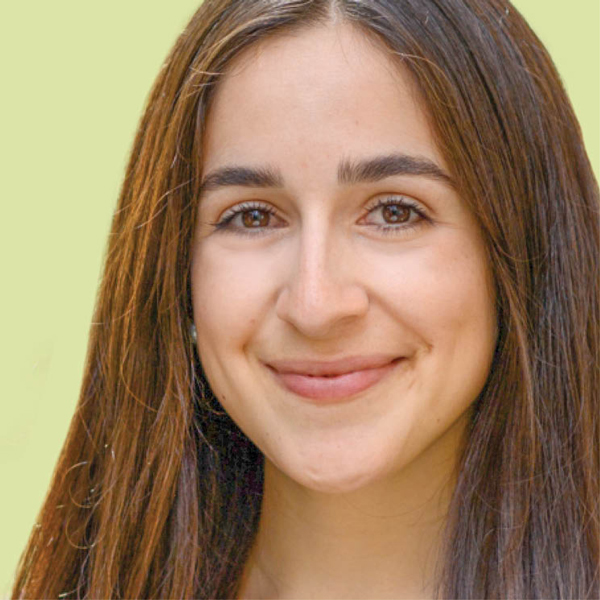

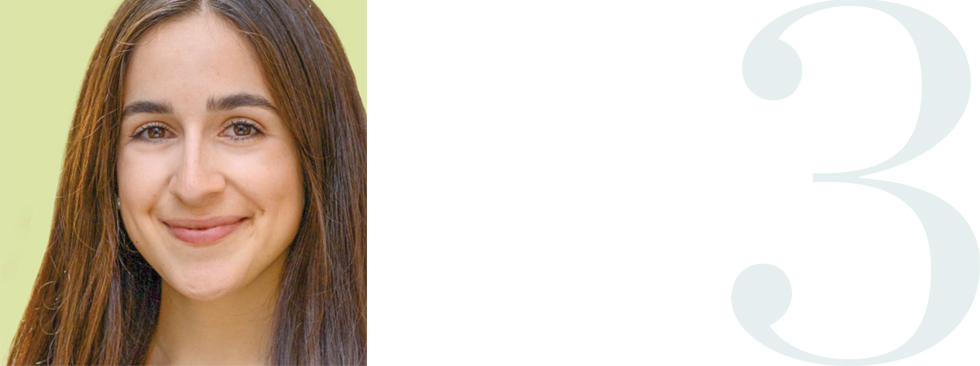
Alexa Salas C’17, L’24, LPS’24
“There were many different barriers and systemic challenges that the families and youth I worked with encountered when applying to college or trying to access healthcare, or employment related issues,” Salas said. “I felt like I was limited in my ability to address them with the skills and knowledge I had at the time.”
Compelled to do more, she enrolled at Penn Carey Law. For Salas, immigration law feels personal.
“My parents are immigrants from Mexico, … so I really identify with the immigrant experience,” she said. “Working at an organization that centers the immigrant experience, like Puentes de Salud, really shaped me, my values, and what I hope to do with a law degree.”
Salas began volunteering at Puentes de Salud—a Philadelphia organization offering medical care, educational support, and social services to the Latinx immigrant community—as an undergraduate at Penn. After winning Penn’s President’s Engagement Prize in 2017, Salas and two other classmates founded Lanzando Lideres in partnership with Puentes de Salud, which eventually adopted the program.
Salas has also explored other areas of the law, including employment discrimination and labor law. “It all affects people’s lives, so I’ve tried to understand different areas of civil law and civil rights law,” she said.
After her first year of law school, Salas interned at Community Legal Services of Philadelphia’s employment unit. She worked on workplace rights issues including unpaid due wages, employment discrimination, sexual harassment, and retaliation. Last summer, Salas interned at the Department of Justice’s Civil Rights Division Employment Litigation Section, which primarily handles employment discrimination within other government entities. Lawsuits range from a local police department using discriminatory hiring practices to a local social services agency terminating someone for a discriminatory reason, she said.
“I enjoyed the ability to connect with the legal issue faced by the client and to think creatively about how some cases can be used to further the protection that the law provides,” Salas said.
At Penn Carey Law, she is particularly proud of her involvement with the Latin American Law Students Association (LALSA), where she served as Co-President last year. She emphasized the importance of creating a supportive community for students coming from underrepresented minority groups. LALSA, she said, also provides a peer-support network in helping students prepare for exams, selecting classes, and talking to prospective students about expectations of life at the Law School. “We’re asserting that we as Latin American students, or students with Latin-American cultures and roots, belong here and others like us belong here,” Salas said.
This past year, she paused her law education to spend time earning her Master of Public Administration degree because she wanted to learn more about policymaking. Salas plans to finish her final year of law school next year.
Ultimately, she hopes to forge a career in civil rights. “What excites me about civil rights litigation is that there are so many different ways that it can look,” Salas said, “and many different statutes to draw from that provide a basis for bringing all kinds of different legal challenges.”
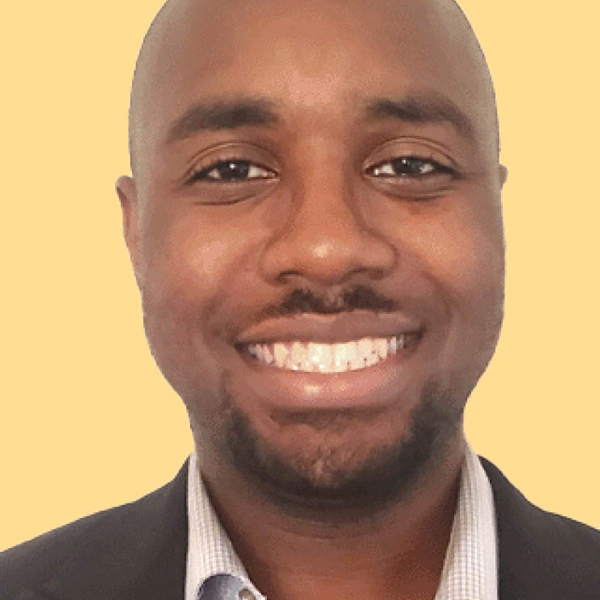


Joshua El-Bey L’23, WG’23
His confidence is grounded on what he says is a simple fact: “Many employers view us as assets to their businesses and their law firms.”
And why not? El-Bey and his 20 classmates in the JD/MBA program will graduate in May with quite a calling card. Most will have spent three years (there is also a four-year program) in the accelerated Francis J. & William Polk Carey JD/MBA Program, studying at both the University of Pennsylvania Carey Law School and the Wharton School, two of the premier professional schools in the country.
“What makes the Carey JD/MBA so unique is that it is a distinct program in its own right—not just two top degrees in law and business,” said Amanda Aronoff, Managing Director of Cross-Disciplinary Programs & Academic Options at Penn Carey Law. “It is a carefully tailored program for inside and outside of the classroom with a tight-knit, supportive community. We also have dedicated staff specifically for the students in this program—in admissions, student programming, and career services.”
Aronoff said El-Bey is indicative of the quality of students produced in the program, calling him “super smart, dynamic, and thoughtful.”
El-Bey said the JD/MBA program has taught him how to develop an executive presence—a crucial attribute given his aspirations—and introduced him to the seminal legal rules that govern business. Plus, he got to explore different career paths and discover the best fit for him. With graduation looming, he landed on management consulting because it will give him the opportunity to advise corporate leaders and make connections that could lead to a job in the executive suite. After graduation, he will work as a Senior Management Consultant in Deloitte’s Philadelphia office.
El-Bey, a native of Brooklyn, New York, earned a Bachelor of Arts in Political Science with coursework in Economics at Yale. Following graduation, he worked as a legal assistant at Fragomen, Del Rey, Bernsen & Loewy LLP and did a pre-law fellowship at Latham & Watkins, where he closely observed the work of corporate lawyers. Previously, he taught at Success Academy, a charter school in Brooklyn.
Over the course of the JD/MBA program, he interned with the Philadelphia Energy Authority where he assisted with the launch of the Green Bank, a financial instrument to fund efforts to increase energy efficiency and encourage greater use of solar and wind power.
The businessman-in-waiting spelled out the virtues of the JD/MBA. He cited the proximity of the Law School and Wharton—a five-minute walk apart—as well as the opportunity to share ideas with “an unparalleled network” of future business and legal leaders of America.
In fact, El-Bey considers camaraderie one of the high points of his time in the program; he served in 2021-2022 as Co-President of the JD/MBA Student Association, which recruits new 1L students to the program, and said a group of JD/MBAs lived in the same house last year. This shared living space fostered deep, lifelong connections among the residents as well as others in the program who attended social events at the house.
As bullish as he is about the JD/MBA, El-Bey thinks in a cross-disciplinary profession every Penn Carey Law student should make an extra effort to absorb the guiding principles of business.
“I always encourage Penn Carey Law students, even if they’re not taking the JD/MBA, to at least do the Wharton certificate to learn about management at the business school.”